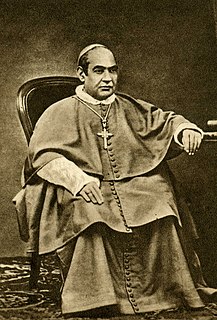A Quote by Anthony Mary Claret
When you see a condemned man on his way to the gallows, it moves you to pity. If you could do something to free him, you would do it. Well, brothers and sisters, when I see a person in mortal sin, I see someone drawing nearer with every step to the gallows of hell. And seeing him in this unhappy state, I happen to know the way to free him: that he be converted to God, ask God's pardon, and make a good confession. Woe betide me if he does not.
Quote Topics
Related Quotes
He was free, free in every way, free to behave like a fool or a machine, free to accept, free to refuse, free to equivocate; to marry, to give up the game, to drag this death weight about with him for years to come. He could do what he liked, no one had the right to advise him, there would be for him no Good or Evil unless he thought them into being.
Every subject's duty is the King's; but every subject's soul is his own. Therefore, should every soldier in the wars do as every sick man in his bed, wash every mote out of his conscience; and dying so, death is to him advantage; or not dying, the time was blessedly lost wherein such preparation was gained; and in him that escapes, it were no sin to think that, making God so free an offer, He let him outlive the day to see His greatness and to teach others how they should prepare.
A sick person is Allah's guest for as long as he is ill. Every day he is sick, God gives him countless rewards, as long as he says ' al hamdulillah', praise be
to God, and does not fight it and complain. When God returns to him his health, he expiates his sins and gives him the status of the newly-born
(completely pure and free of any sin). Illness is a mercy and a blessing.
And when I hear it said that God is good and He will pardon us, and then see that men cease not from evil-doing, oh, how it grieves me! The infinite goodness with which God communicates with us, sinners as we are, should constantly make us love and serve Him better; but we, on the contrary, instead of seeing in his goodness an obligation to please Him, convert it into an excuse for sin which will of a certainty lead in the end to our deeper condemnation.
St. Augustine and St. Thomas define mortal sin to be a turning away from God: that is, the turning of one's back upon God, leaving the Creator for the sake of the creature. What punishment would that subject deserve who, while his king was giving him a command, contemptuously turned his back upon him to go and transgress his orders? This is what the sinner does; and this is punished in hell with the pain of loss, that is, the loss of God, a punishment richly deserved by him who in this life turns his back upon his sovereign good.
Man is sitting disconsolate on an anthill one morning. God asks him what the matter is and man replies that the soil is too swampy for the cultivation of the yams which God has directed him to grow. God tells him to bring in a blacksmith to dry the soil with his bellows. The contribution of humanity to this creation is so important. God could have made the world perfect if he had wanted. But he made it the way it is. So that there is a constant need for us to discuss and cooperate to make it more habitable, so the soil can yield, you see.
Woe to him whom this world charms from Gospel duty. Woe to him who seeks to pour oil upon the waters when God has brewed them into a gale. Woe to him who seeks to please rather than to appal. Woe to him whose good name is more to him than goodness. Woe to him who, in this world, courts not dishonor! Woe to him who would not be true, even though to be false were salvation. Yea, woe to him who, as the great Pilot Paul has it, while preaching to others is himself a castaway.
I believe in God. Nobody made me believe; I don't think you can or should try to force someone to believe something. And even though my parents taught me stuff about God and read Bible stories to me from as early as I can remember... it was my choice to become a believer in Him. The way I see it, putting our faith in God is something that each person has to come to on his or her own. It's your own personal relationship with Him; a bond that's as unique as a fingerprint.
For here we are so blind and foolish that we never seek God until he, of his goodness, shows himself to us. It is when we do see something of him by his grace that we are stirred by that same grace to seek him, and with earnest longing to see still more of his blessedness. So I saw him and sought him; I had him and wanted him. It seems to me that this is and should be an experience common to us all.
When a man is in God's grace and free from mortal sin, then everything that he does, so long as there is no sin in it, gives God glory and what does not give him glory has some, however little, sin in it. It is not only prayer that gives God glory but work. Smiting on an anvil, sawing a beam, whitewashing a wall, driving horses, sweeping, scouring, everything gives God some glory if being in his grace you do it as your duty.
Once [a soul] is condemned by God, then God's friends agree in God's judgment and condemnation. For all eternity they will not have a kind thought for this wretch. Rather they will be satisfied to see him in the flames as a victim of God's justice. ("The just shall rejoice when he shall see the revenge . . ." Psalm 57:11) They will abhor him. A mother will look from paradise upon her own condemned son without being moved, as though she had never known him.
A man follows the path laid out for him. He does his duty to God and his King. He does what he must do, not what pleases him. God's truth, boy, what kind of world would this be if every man did what pleased him alone? Who would plough the fields and reap the harvest, if every man had the right to say, 'I don't want to do that.' In this world there is a place for every man, but every man must know his place.
































